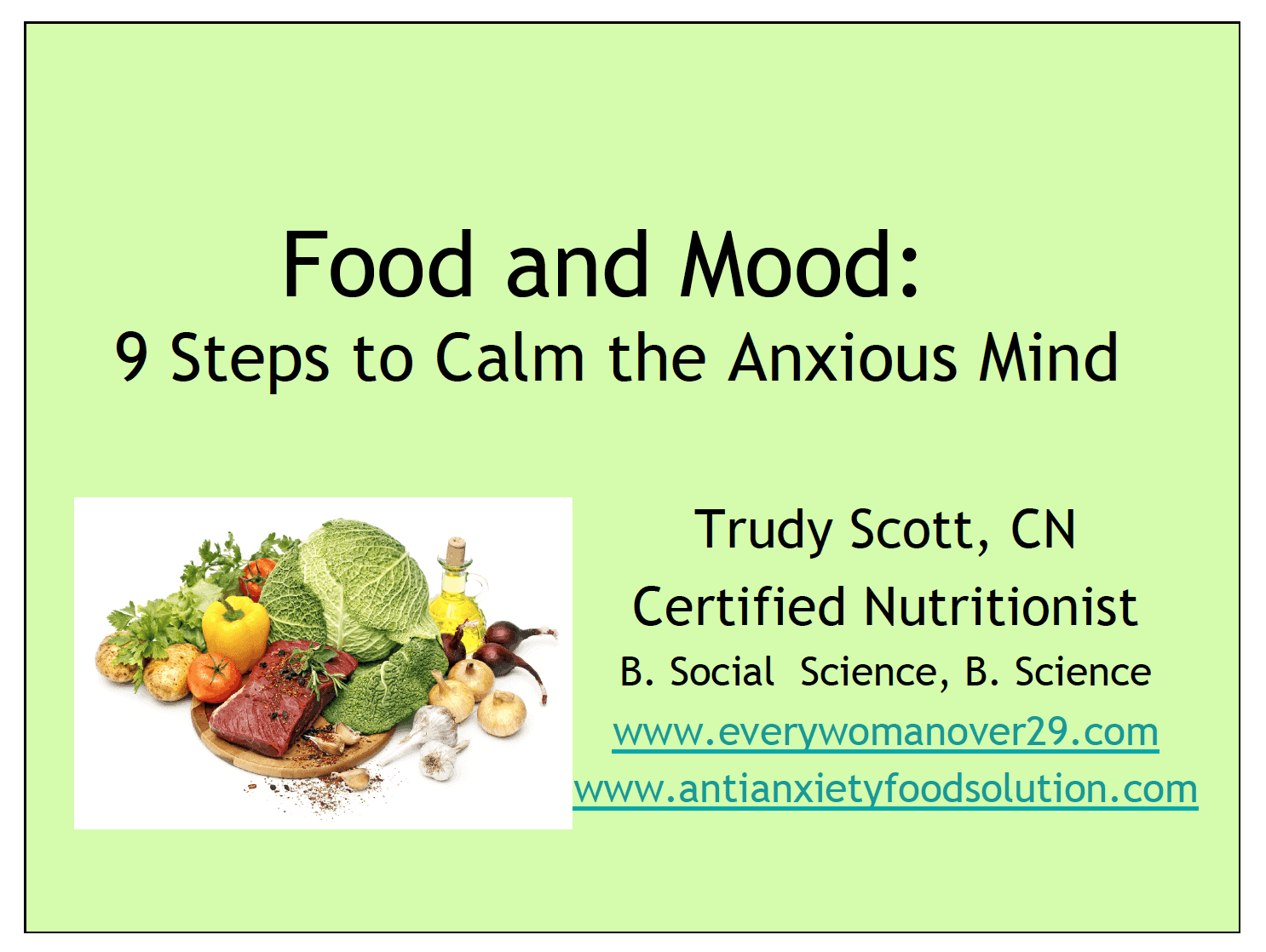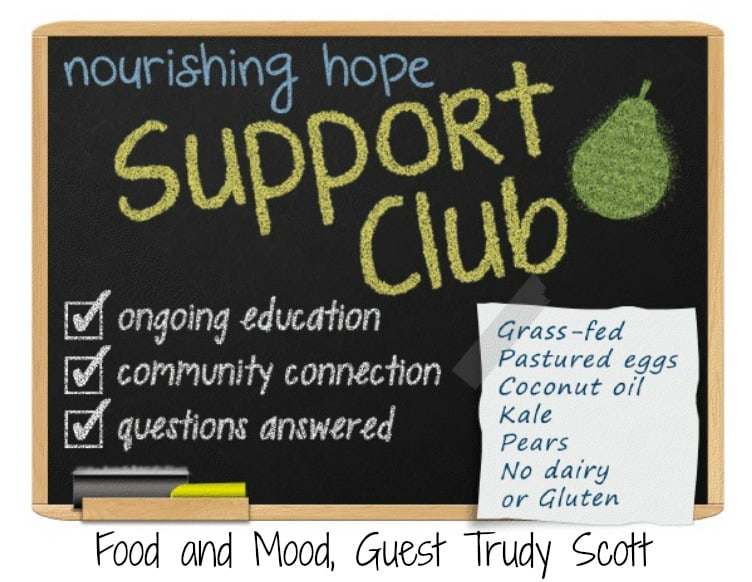 The following is an article written by my friend and colleague, Certified Nutritionist, Trudy Scott. Trudy was our guest speaker on the very important topic of Anxiety for our Nourishing Hope Support Club.
Anxiety is quite common in children with autism (and well as their mothers and the general population), and understanding the underlying biochemical and nutritional factors can go a long way to improving this condition. Join us for this Support Club session. If you are not already a member, join now.
The following is an article written by my friend and colleague, Certified Nutritionist, Trudy Scott. Trudy was our guest speaker on the very important topic of Anxiety for our Nourishing Hope Support Club.
Anxiety is quite common in children with autism (and well as their mothers and the general population), and understanding the underlying biochemical and nutritional factors can go a long way to improving this condition. Join us for this Support Club session. If you are not already a member, join now.
There is a growing body of evidence supporting the very powerful connection between food and mental health disorders such as anxiety and depression. Dr. Felice Jacka, is an Australian researcher who is one of the lead researchers on food and mental health. In this 2010 study (1) in The American Journal of Psychiatry, lead author Dr. Jacka, found that a “western” diet of processed or fried foods, refined grains, sugary products, and beer was associated with a higher risk of anxiety and depression in women. The “traditional” diet or real whole food diet was associated with a lower risk of anxiety and depression. This real whole food diet did include grass-fed red meat and she believes following the recommended weekly intake of red meat could boost our mental health. Dr. Felice Jacka , is also the lead author in a 2011 PLoS One paper (2) that found that diet quality in adolescents was associated with a lower risk of mental health issues. They found that “improvements in diet quality were mirrored by improvements in mental health over the follow-up period, while deteriorating diet quality was associated with poorer psychological functioning.” The author stated that this “study highlights the importance of diet in adolescence and its potential role in modifying mental health over the life course.” Another study from 2011 (3) and also co-authored by Dr. Jacka, looked at Norwegian adult men and women, and found that “those with better quality diets were less likely to be depressed” and that a “higher intake of processed and unhealthy foods was associated with increased anxiety.” A 2012 study (4) looked at Canadian adults with mood disorders. Intake of carbs, fiber, total fat, linoleic acid, riboflavin, niacin, folate, vitamin B6, B12, pantothenic acid, calcium, phosphorus, potassium, iron, magnesium and zinc were measured and “higher levels of nutrients equated to better mental health.” One of the study authors, Dr. Kaplan, PhD was quoted as saying: “Doctors should consider counseling their patients to eat unprocessed, natural, healthy foods and refer them to a nutrition professional if specialized dietary consultation is needed.” I’m definitely in favor of this and would love to see all doctors and mental health professionals working as a team with nutrition professionals! A 2012 study (5) done in Australia found that in “addition to the health benefits of a moderate-sodium Dietary Approaches to Stop Hypertension diet on blood pressure and bone health, this diet had a positive effect on improving mood in postmenopausal women.” This diet included plenty of produce and did also include lean red meat, which “was associated with a decrease in depression.” It should be noted that the meat was grass-fed red meat. All in all, there is much recent evidence pointing to some very real benefits for making dietary changes in order to improve mental health outcomes. Clearly, more research is needed especially when it comes to individual nutrients and conditions like pyroluria. Other factors can contribute to anxiety and since we all have our own unique biochemistry it’s a matter of figuring out your trigger/s. I use a comprehensive 9 step approach with my clients to help them overcome their anxiety, depression, emotional eating and sugar cravings. This is what I see with many of my anxious clients: not eating enough protein, excessive sugar consumption and low blood sugar causing anxiety/irritability, social anxiety or pyroluria, gluten intolerance, caffeine consumption, poor digestion, low levels of brain chemicals such as serotonin and GABA and lifestyle factors like lack of sleep. (1) Jacka, F. N., J. A. Pasco, A. Mykletun, L. J. Williams, A. M. Hodge, et al. 2010. Association of Western and traditional diets with depression and anxiety in women. American Journal of Psychiatry 167(3):305-311. (2) Jacka FN, Kremer PJ, Berk M et al. 2011. A prospective study of diet quality and mental health in adolescents. PLoS One. 6(9):e24805. Epub 2011 Sep 21. (3) Jacka FN, Mykletun A, Berk M et al. 2011. The association between habitual diet quality and the common mental disorders in community-dwelling adults: the hordaland health study. Psychosomatic Medicine. 2011 73(6):483-490. (4) Davison KM, Kaplan BJ. 2012. Nutrient Intakes Are Correlated With Overall Psychiatric Functioning in Adults With Mood Disorders. Canadian Journal of Psychiatry. 57:85-92 (5) Torres SJ, Nowson CA. 2012. A moderate-sodium DASH-type diet improves mood in postmenopausal women. Nutrition. Sep;28(9):896-900. Epub 2012 Apr 4. Food Mood Expert Trudy Scott is a certified nutritionist on a mission to educate and empower women worldwide about the healing powers of food in order to find natural solutions for their anxiety, depression, emotional eating and sugar cravings. Trudy works with clients one-on-one and in groups, serving as a catalyst in bringing about life enhancing mood transformations that start with eating real whole food and using some pretty amazing nutrients. Trudy is author of The Antianxiety Food Solution: How the Foods You Eat Can Help You Calm Your Anxious Mind, Improve Your Mood & End Cravings (New Harbinger, 2011). Trudy publishes an electronic newsletter entitled Food, Mood and Gal Stuff, available at www.everywomanover29.com and www.antianxietyfoodsolution.com
 Nourishing Hope Support Club Session
Food and Mood: 9 Steps to Calm the Anxious Mind
Guest Speaker: Trudy Scott, Certified Nutritionist
There is much recent evidence supporting the powerful food-mood connection and there are some very exciting recent studies that support this for both anxiety disorders, stress and other mood disorders. Trudy uses a comprehensive 9 step approach with her clients to help them overcome their anxiety, depression, emotional eating and sugar cravings. It is, of course, customized to their unique biochemistry, and includes:
Nourishing Hope Support Club Session
Food and Mood: 9 Steps to Calm the Anxious Mind
Guest Speaker: Trudy Scott, Certified Nutritionist
There is much recent evidence supporting the powerful food-mood connection and there are some very exciting recent studies that support this for both anxiety disorders, stress and other mood disorders. Trudy uses a comprehensive 9 step approach with her clients to help them overcome their anxiety, depression, emotional eating and sugar cravings. It is, of course, customized to their unique biochemistry, and includes:
- Real whole traditional food, including quality grass-fed red meat and 4 unique antianxiety food solutions
- Why and how to quit sugar with no willpower required and how to control blood sugar swings
- The effects of caffeine
- The importance of optimal digestion
- The bad-mood effects of gluten
- How to balance brain chemistry with individual amino acids to improve mood and stop cravings in their tracks
- How to correct social anxiety / pyroluria with zinc and vitamin B6
- The effects of other nutrients (such as low vitamin D), hormones and medications
- Simple lifestyle changes that include sleep, exercise and yoga





Julie
I’m thrilled to have the opportunity to share this information with the members of your support club!
I’m looking forward to it!
Thanks for all the wonderful work you do in the autism world!
Trudy